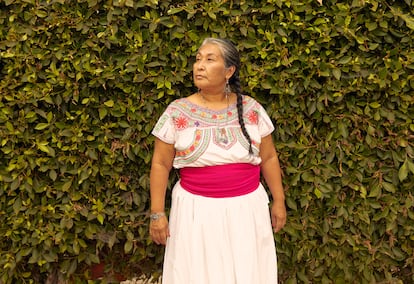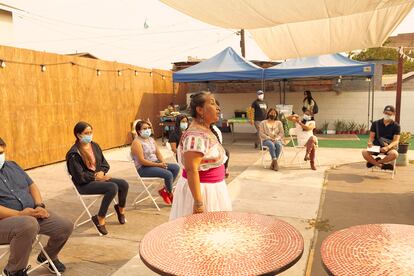The Zapotec woman building indigenous communities in Los Angeles
Odilia Romero, who migrated to California from southern Mexico 40 years ago, now helps others retain their identities through cultural programs, language courses and legal support networks

On a dark map of the broad streets and intertwined freeways of Los Angeles, there is a shining light. The interactive map is displayed on a screen, and when the mouse cursor comes near the light, its meaning becomes clear: it denotes that around 1,200 people in that area speak an indigenous language. If the user zooms out, the city map suddenly fills up with many dots of light, indicating that the City of Angels does not just buzz with English and Spanish. It also speaks the Zapotec, Maya and Chinantecan languages.
This map is on display along with others at the Los Angeles County Museum of Art (LACMA), where it is part of an exhibition called Mixpantli: contemporary echoes. It was produced by Comunidades Indígenas en Liderazgo (Cielo), a grassroots organization founded in 2015 by Odilia Romero, 50, who now helms the association together with her daughter Janet Martínez, 33. Their research is helping identify the indigenous community networks of Mexicans and Guatemalans living in Los Angeles, which is home to around 200,000 Zapotecs, the ethnic group that Odilia belongs to.
Her parents, Eulogia and Everardo, came to the United States in the 1980s from San Bartolomé Zoogocho, in the southern Mexican state of Oaxaca. Odilia stayed behind until the day when a relative abused her. That is when her parents sent for her. It was the beginning of an immigration journey that was not just physical but also involved an inner transformation. “We are without land,” says Odilia, who has been living in the US for 40 years now. “We are like a plant inside a little pot. We no longer have very deep roots in our own earth, but we have roots in the community, in the imaginary world we live in and which is here,” she says, speaking from the office of her association. An estimated 1.2 million Mexicans from Oaxaca now live in California, which is why the state is sometimes known as Oaxacalifornia.

Her organization started operating in 2015 with cultural programs, but the Covid-19 pandemic changed everything. Cielo created a solidarity fund for migrants without legal papers, and up until a few weeks ago, the fund had helped channel $2.2 million from various foundations for indigenous people, many of whom provide essential services in the US economy. Cielo has also organized language lessons to teach Zapotec, Maya, Yucatec and Mixtec to migrants wishing to brush up on their parents’ native tongue.
The association has also managed to bring together a network of 300 translators who help migrants speaking little Spanish and even less English at court hearings in California and other US states. Cielo has received up to 500 calls a day requesting this type of service, says Odilia Romero as she bites into a tlayuda, a typical dish from Oaxaca made with a giant corn tortilla, asiento (fat from fried pork rinds), beans and melted cheese. The dish has been prepared by her partner, Alfonso Martínez, better known as Poncho, whose creation adds to Los Angeles’ vast street-food scene.
Every Friday, tlayudas get sold inside the garage of the association’s premises. On those nights, the mezcal flows freely and guests bite into Poncho’s organic blood sausage, which he learned to prepare thanks to a recipe that Odilia’s parents brought with them from Mexico. “It’s very important for food to have a heart,” says Odilia. “When my parents cook, they have music on all the time, and they are always laughing. You cannot cook when you are angry. Same when you are in a rush. When Poncho is short on time, his sausages just break up.”
Both are helping create an identity among the indigenous communities of the US: Poncho does it through food, and Odilia through language.
Tu suscripción se está usando en otro dispositivo
¿Quieres añadir otro usuario a tu suscripción?
Si continúas leyendo en este dispositivo, no se podrá leer en el otro.
FlechaTu suscripción se está usando en otro dispositivo y solo puedes acceder a EL PAÍS desde un dispositivo a la vez.
Si quieres compartir tu cuenta, cambia tu suscripción a la modalidad Premium, así podrás añadir otro usuario. Cada uno accederá con su propia cuenta de email, lo que os permitirá personalizar vuestra experiencia en EL PAÍS.
¿Tienes una suscripción de empresa? Accede aquí para contratar más cuentas.
En el caso de no saber quién está usando tu cuenta, te recomendamos cambiar tu contraseña aquí.
Si decides continuar compartiendo tu cuenta, este mensaje se mostrará en tu dispositivo y en el de la otra persona que está usando tu cuenta de forma indefinida, afectando a tu experiencia de lectura. Puedes consultar aquí los términos y condiciones de la suscripción digital.









































